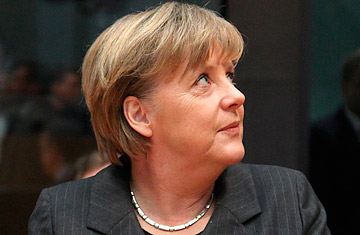
German Chancellor Angela Merkel in Berlin, Feb. 10th, 2011.
For Germany's Christian Democrats, it was a catastrophic start to the so-called super-election year. In the first of seven key regional polls, Chancellor Angela Merkel's party suffered a devastating defeat in the northern city of Hamburg on Sunday. After almost ten years in opposition, the Social Democrats (SPD) trounced the Christian Democratic Union party (CDU), winning 48.3% of the vote and securing an absolute majority. The CDU, meanwhile, saw support collapse to a historic low of 21.9%. And while the Social Democrats celebrated on Sunday night — "This is a very, very impressive result," said new Hamburg mayor Olaf Scholz to a cheering crowd of supporters — observers couldn't help but wonder whether this was a sign of things to come for the CDU.
For their part, Merkel and conservative party leaders tried to play down the defeat by pointing to the fact that the election in Hamburg was fought on local issues, such as school reform, unemployment and the banking crisis, and so would have no impact on the party's standing on the federal level. The Chancellor also blamed the defeat on the resignation of popular CDU mayor Ole von Beust, who quit his post in July 2010, eventually leading to the collapse of the CDU-Green coalition government in Hamburg. Von Beust's departure "clearly disappointed many voters" Merkel told reporters on Monday, acknowledging that her party had experienced a "bitter defeat."
But while local issues were certainly game-changers — Scholz appealed to traditional conservative voters by presenting himself as a safe pair of hands on the economy and friend of business interests — observers say the damage done to CDU won't be contained to a local level. "The Hamburg election is a severe blow to Merkel's conservatives at a federal level," Gero Neugebauer, a political scientist at the Free University of Berlin, tells TIME. "The CDU is losing many of its core voters in the center to the Social Democrats and smaller opposition parties — and as the economy improves, voters are switching to the SPD on the big issues, like education and family policy."
But some analysts note that Merkel still enjoys the backing of many voters and caution against over-interpreting the election result in Hamburg. Over the past year, Merkel's center-right coalition has presided over a turnaround in the country's economic fortunes. The German economy is powering ahead — the government recently raised its 2011 growth forecast to 2.3% — unemployment is falling, exports are booming and business confidence is at a record high. As other euro-zone members continue trying to claw their way out of debt, Germany is calling the shots when it comes to coordinating economic policy among the 17 members of the common currency. In early February, Merkel floated the idea of a "competitiveness pact," along with the French President Nicolas Sarkozy, to boost growth and competitiveness in the euro zone. "Chancellor Merkel's CDU is the strongest party in Germany but Angela Merkel's coalition partner, the pro-business Free Democratic Party (FDP) is weak," says Matthias Jung, head of the Mannheim-based polling institute Forschungsgruppe Wahlen, claiming that the Chancellor's biggest challenge is "to keep her feuding coalition partners together and present a united front to voters."
Merkel faces three especially significant regional elections in March, including a poll on March 27 in Baden-Württemberg, a traditional conservative stronghold in southwest Germany. Merkel's government has recently been rocked by growing speculation that Defense Minister Karl-Theodor zu Guttenberg, the charismatic media darling and Merkel's likely successor as Chancellor, may be considering quitting his post amid allegations that he plagiarized parts of his doctoral thesis. The scandal has escalated in recent days — on Monday evening, zu Guttenberg announced he was going to renounce his doctoral title for good in an attempt to defuse the controversy. While Merkel has thrown her support behind her popular cabinet minister, the affair has damaged the image of her government. Coming on top of her party's electoral rout in Hamburg on Sunday, Merkel faces a torrent of negative headlines in the next few weeks that she might find difficult to reverse.
